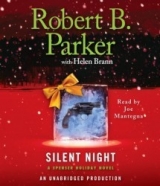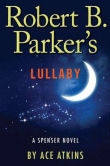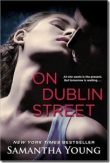
Текст книги "Silent Night"
Автор книги: Robert B. Parker
Соавторы: Helen Brann
Жанры:
Криминальные детективы
,сообщить о нарушении
Текущая страница: 4 (всего у книги 9 страниц)

HAWK AND I sat in my car and looked back at Street Business. We seemed to be doing a lot of sitting in my car lately. Maybe it was the start of a new holiday tradition. Next year we could change it up a little and sit in Hawk’s car.
“How you feeling about Street Business now?” I said.
Hawk nodded his approval. “Not bad,” he said. “This Jackie seem sincere, seem good with the kids. Place be clean and tidy. Kids look happy, like they gettin’ fed and looked after. Got structure and routine.”
“Is it a place you would have wanted to be when you were a kid?”
Hawk shook his head.
“Not what I wanted, way I was then. Didn’t want no structure, didn’t want no rules.”
“But you wanted to eat. A place to sleep.”
“Food always come with some catch. Rules. Tradeoffs. Someone tryin’ to save me. Didn’t want that. Needed to find my own way.”
“So—what, then?”
“Man I am now can look back, say sure, would’a been nice to have someplace safe to go, place where you knew somebody give a rat’s ass, could teach you things. Didn’t want that then.”
He turned to me and grinned. “’Course, I lived in a place like that, probably grow up to be a minister. Or worse, an Afro-American you.”
“We so different?”
“Different enough. You got rules.”
“And you don’t?”
“Just a few. Need a whole book for your rules. Have to think too much. Turns you soft sometimes. I try to live your way, I be dead long ago.”
“And you think Street Business might make those kids soft?”
“Just sayin’ the world be a pretty simple place when you just tryin’ to stay alive.” He fell silent for a moment. “Street Business be good if it gives kids a safe place off the streets. Even better if it teach them skills. Someday they got to go out on their own, leave Street Business behind. Got to be ready when that day comes.”
“Give a man a fish versus teach a man to fish.”
“Always comforting to hear you quote Scripture,” Hawk said.
“Anything trouble you about this place?”
Hawk thought for a moment. “Couple of things. Something go wrong down here, sure would hate to depend on ol’ Frankie.”
“Yeah,” I said. “You’ve got to admire a man who loves his work. I’ve met the other member of the security detail. He’s pretty much the same.”
“Don’t know this Juan Alvarez, but you think if he so concerned about his brother, he make sure his team fell in line.”
“Or bring in a team that did,” I said. “What else?”
Hawk looked out the car window. “Neighborhood’s too quiet.”
He was right. The block was deserted. Except for Street Business, there were no lights visible in the windows of any building on either side of the street. There were no Christmas lights, no menorahs, no holiday decorations for the length of the block. I realized that in the entire time Hawk and I had been in the car, we had seen no traffic, no pedestrians, no kids pulling sleds or throwing snowballs.
We waited and watched for signs of life. Fifteen minutes passed and nothing changed.
“No Whos in Whoville,” I said.
“Maybe the Rapture just happened,” said Hawk, “and we got left behind.”
Dusk settled over the neighborhood. The streetlights kicked on, offering a thin canopy of light over the street.
“Still curious why Alvarez don’t wanna sell these houses,” Hawk said.
“Well,” I said, opening my car door, “since we’re in the neighborhood, let’s find out what makes them so special.”
The first one we chose was quiet and dark inside. If anyone was upstairs, we did not hear them. I turned on a couple of lamps in a room that once had passed as a parlor but now looked like the final resting place for furniture the Salvation Army wouldn’t take. The two sofas were sprung, and the chair cushions looked as greasy as two-day-old stir-fry.
In the kitchen, dirty dishes were piled in the sink and laundry was heaped by the washer.
“Tidy bunch,” Hawk said.
“No sports equipment or video games. Nothing for kids.”
“These aren’t kids. These employees,” Hawk said.
I entered a larger room with a desk in the corner. I was shuffling through some papers lying on the scarred Formica top when I heard footsteps.
I turned, and a tall man with a red crew cut was pointing a small handgun at me. Hawk was nowhere in sight.
“Who are you?” he said. “What are you doing here?” He was lean and strong-looking, in better shape than either Joe or Frankie at Street Business.
“I’m going door-to-door collecting for charity,” I said. “We want to send all the underprivileged kids in Weston to violin camp. Would you care to contribute?”
“Not funny, asshole,” Redhead said. “Hands up where I can see them.”
I raised my hands, and he continued to point the gun at my chest. He seemed uncertain about what to do next.
“How’d you get in here?” Redhead was doing his best to look menacing. The gun helped.
“Chimney,” I said. “Just like Santa.”
Redhead opened his mouth to say something. He never got the chance. Hawk appeared behind him and put one arm around Redhead’s neck and his knee deep into his back. Redhead let out a choked snarl and dropped his gun. I picked it up and stuck it in my pocket.
Hawk let Redhead go.
I looked down at the floor where Redhead sat with his head down. He had left a small duffel bag in the doorway, which I inspected while Hawk watched him. Five hundred in big bills and a round-trip economy ticket to El Paso, Texas. A small notepad filled with dates and numbers. I tucked it inside my pocket.
I looked at Redhead. “You live here?”
He stared at the ground and said nothing.
“Want to tell us what’s so great about El Paso at Christmas?”
Redhead remained enamored with a spot on the wooden floor. He shook his head.
“Maybe he just shy,” said Hawk. “Could use a little encouragement to facilitate some conversation.”
Redhead started to shake a little.
“No,” I said. “Let’s go.”
“No?” Hawk said. “Guy almost shot you.”
“Almost,” I said. “And we did invite ourselves in.”
Hawk shook his head. “Rules, Spenser. Rules gonna get you killed someday.”
“Maybe,” I said. “But not today.”

I WAS SITTING AT MY DESK with my feet up, contemplating the cooking of the turducken for our Christmas dinner. It needed to roast for seven hours. I was counting backward from our appointed dinner hour of two in the afternoon to figure out when it should go in Susan’s oven. Then the door to my office opened and Juan Alvarez came in.
“I hope you don’t mind the intrusion,” he said. His tone suggested he didn’t much care whether I minded or not. He carried his overcoat on his arm. He wore a tweed jacket with smooth leather patches at the elbows, a tartan vest, and a green tie patterned with small yellow animals that looked like little foxes.
I motioned to the chair opposite my desk.
He shot me a baleful look with his hard brown eyes. “You, Spenser, are not who you say you are. You are a private investigator. You never mentioned that when we were introduced.” He sounded genuinely injured.
“I also didn’t tell you that I enjoy piña coladas and walks in the rain,” I said. “And, I might add, you never asked.”
“I hear that you or someone working with you has been snooping into my private affairs. If that’s true, I’d like it to stop. I’m sure there must be some misunderstanding.” He gave me a faint smile.
“What exactly have you heard, Juan?” I said.
“My foreman told me that you came out to my farm in Weston a few days ago. And one of my men in the city reports that you visited one of my properties recently. Each time with some black man. Each time one of my employees was attacked.” He leaned forward toward me. “True?”
“A lot of people say that about Hawk,” I said. “They look at him and say, ‘That is some black man.’”
He got up. “This is not a joke to me, Spenser. You are interfering with how I run my business. I don’t know what you’re trying to do. I thought when we met the other night we met as friends. I still hope so.” He paused. “But please understand. If you don’t stop, I will stop you.”
I let his words hang in the air for a moment.
“I’m sure you’re serious, Juan,” I said. “I’m also sure you are aware that someone has been threatening your brother and his boys’ shelter. In fact, if you recall our delightful encounter at the charity auction, you might remember my informing you that Jackie had requested my help in making the threats stop.”
“I am quite capable of protecting my brother,” Alvarez said. “And I fail to see the connection between Jackie’s problems and your invasion of my properties.”
“Fair enough,” I said. “My investigative methods may seem as opaque to you as your business dealings do to me. We both have an interest in knowing who might be threatening Jackie and Street Business. Any ideas?”
Alvarez’s demeanor softened, and he sighed. “Jackie,” he said. “He’s tried so hard, and always manages to fail. His intentions are good, but that’s not enough. Street Business is just a pipe dream, I’m afraid.”
“It may be ambitious,” I said. “But who would want to see it fail?”
Alvarez shrugged. “Who knows? Anybody. Everybody. Maybe a gang that sees Street Business as an invasion of its turf. Drug dealers or other criminals who see it as a threat. So-called concerned citizens. Not everyone supports housing homeless kids in the community, as you might imagine. Even real estate developers, perhaps. We have had many offers to purchase our buildings on Curtis Street, mine as well as Jackie’s.”
“I’m curious, Juan,” I said. “Why do you own so many properties on Curtis Street?”
He smiled without warmth. “I have many employees. There is not enough room for them all at my farm in Weston. And, frankly, I keep a couple of men in town to keep an eye on Jackie and Street Business, to make sure everything goes well.”
“So why do you continue to support Street Business if you think it’s a pipe dream?”
“Jackie is my brother, Spenser,” he said. “He is family. I promised my mother that I would support and protect the family, Jackie most of all. As long as he believes in Street Business, I must not fail him. To do so would be to dishonor my mother and the memory of my father. That I won’t do.”
Alvarez gathered his coat and pulled a pair of leather gloves from his pocket.
“Thank you for your time, Spenser. I trust we have simply had a misunderstanding. I will take care of my brother. It is difficult with my travel schedule and business obligations, but he is my responsibility.”
“I understand you travel quite a bit,” I said. “I hope you get a break for the holidays. Any chance you’re heading south of the border for New Year’s?”
He put his gloved hand out to shake mine. “Merry Christmas, Spenser. May the New Year bring you peace and prosperity.” His grip was strong and his smile cold.

THE VISIT FROM Juan Alvarez had annoyed me enough that I abandoned my further thoughts of the turducken and decided to catch up with the sports section of The Boston Globe instead. Outside it looked cold, but the sun was shining. A few shoppers, bundled against the weather, clutched shopping bags as they hurried down the street. Patches of snow lay in irregular patterns across the Boston Garden.
My office door opened, and Carmen came in. She held out her hand. “Hello again, Spenser.”
“Hello, Carmen.”
Her hand was cold from the outdoors, and it looked like she bit her fingernails. She had a strong grip. She wore no makeup on her smooth, dark skin except for a touch of lipstick. She smiled at me. I smiled back. I wondered how it must feel to be a woman whose looks were so startling. The combination of her blue eyes and strong features was oddly electric. I sat down again behind my desk. And waited for her to begin.
She was wearing clean, well-worn blue jeans, work boots, and a blue-and-green checked wool shirt over a white tank top. She put her sheepskin parka on the back of my visitor’s chair. Her hair was straight and fell to her shoulders, and was so dark it was almost black. She gave me an open, friendly look. And there were those eyes again.
“And what can I do for you?” I said.
“I hear you help people. Jackie told Slide, and Slide told me.”
“Word gets around.”
“Yes.” She paused. “You know Jackie is Juan’s younger brother?”
“Yes,” I said. “Is that a problem?”
Carmen frowned. “Juan Alvarez is the reason I need your help.”
“Maybe this would be easier if I offered you a cup of coffee?”
“Do you have anything stronger?” she said.
“My coffee is pretty strong,” I said, “but yes, as a matter of fact, I do.”
I pulled my emergency bottle of Johnnie Walker Blue and two water glasses from the cabinet against the wall, and grabbed the tray of ice cubes from the small refrigerator next to my desk. I dropped the ice cubes one at a time into the glasses and poured two fingers of scotch into each glass. I handed her one and returned to my desk with the other.
“How can I help?” I said.
Carmen took a sip of the scotch, rolled it around her mouth, then closed her eyes and swallowed. It was good to encounter a woman who enjoyed scotch.
“I come from a very poor area near San Juan. My father is Puerto Rican, my mother was Irish. She died when I was two. My dad had a lot of different jobs when I was growing up. Sometimes he drove a cab. Sometimes he gambled or dealt drugs. Small-time stuff. It was a shame, too, because he had a knack for sports. He played a little tennis and fell in love with the game. He put a racquet in my hand as soon as I could hold a doll. He saw what I could do, saw it could get us out of that slum we lived in.” She looked at me hard.
I waited. She sipped her drink.
“Go on,” I said.
“I was his ticket. I was a quick study, and he saw a way out. He coached me, just like a lot of parents have coached their kids in tennis. Parents coached both Martinas, Steffi Graf, the Williams sisters, all of us. My dad worked me very hard, but I loved it. And I was talented. I was headed for the big time. Started when I was eight and never looked back.” Her voice rose slightly. “By the time I was twenty, I was playing Wimbledon, the Open. And not just playing. Winning.”
I waited while she went back. I waited some more. Then I said, “What happened?”
She took a deep breath and focused on me again.
“The papers said that my knees went bad. I was only twenty-two, and I had to retire from professional tennis. The real story is a little different.”
“You want to tell me about it?”
“I fought with my dad. I was rebellious and wanted to be independent. I thought I knew everything. He stopped coaching me and left the circuit in disgust. I went crazy from the fame and money. I was wild and tried everything that came my way. Booze, drugs, men, women, you name it. I was young and healthy and strong and did my workouts and continued my training no matter what else I did at night. And I was able to get away with it for a while.” She took a swallow of her scotch and looked hard at me with her amazing eyes. “You know how easy it is to throw everything away when you never had anything to begin with?”
I nodded.
“I thought I was invincible.” She gave a mirthless laugh. “When I hit bottom, I hit pretty hard. I don’t seem to do things halfway.”
“And now?”
“A couple of years ago I got straightened out. There was a very rich man I had met in London when I was playing Wimbledon who now lives in Boston. I ran into him.” She paused. “When we first met, I had no idea he knew my father, that his family had left the same bad neighborhood in Puerto Rico and come over here to live in Lawrence.”
I nodded. “Juan Alvarez.”
“Yes. Almost four years ago he got me into a rehab place, and after I got out he took me to live with him in Weston at his farm. He wants to get married, but that’s not for me.” She smiled. “I don’t mind playing his hostess at his social events, and up until recently he’s been good to me. I got bored sitting around while he traveled, which is a lot, so in my spare time I started giving tennis lessons to the area children, and some of the adults, too. People here have plenty of money for that. Juan loves tennis himself and built a beautiful all-weather tennis court in his big barn. Despite my ups and downs, I’ve kept in touch with my good friends, and once in a while I get a big-name player to come out for a match. So I’ve managed to rehab my reputation a bit as well.”
“That’s good to hear. But we haven’t gotten to the why-you-need-me part,” I said.
“Juan Alvarez is not the man I thought he was. When I knew him before, he was kind and gentle. And that is the way most people see him. But gradually I have learned that he can be vicious and cruel. He hides this side brilliantly, but now I see it. Until now, I managed to escape his temper, but when a runaway boy came to the barn out of nowhere and I befriended him, Juan was furious and ordered me to get rid of him or he would make him disappear. He was jealous of my affection for a lost boy, and I knew he meant he would do the boy great harm.”
“Has he actually acted on his threats?”
“I have heard from some of his employees that he has had people beaten and tortured. Even killed. Sometimes for minor mistakes, silly things. Last week, a maid forgot to lock the front door of the house. Juan had one of his men slam the door on the woman’s hand. He broke several bones in her hand.”
“This may be a dumb question, but did she report it to the police?”
Carmen smiled without humor. “No,” she said. “She is undocumented. Most of Juan’s workers are. If they go to the police, they will be deported. He has also convinced them that worse things will happen.”
“Like what?”
“Many of the workers have children. If the parents try to leave or make trouble, they fear Juan will harm their children, or they will never see their children again. He encourages that fear.”
“Because they are illegal, they have no protection from him.”
“Yes. I’ve heard he also holds some children of people he does business with in Mexico, to make sure they don’t double-cross him in business dealings. He’s stowed these kids, three or four at most, at Street Business, and Jackie knows nothing about it. And when officials question what goes on at Street Business, Juan pays off whoever he needs to to keep Street Business above the law. This way Street Business always looks clean. Of course, it’s all a lie, but he’s got enough money to keep everyone involved quiet.”
I sat back and contemplated what she said.
“Jackie is so sincere, and he looks up to Juan so much. He is blind to what Juan really is,” she said. “I am very fond of Jackie. He’s been so good to Slide.”
“You mentioned torture and murder. Have you seen Juan actually harm someone?”
“No, it’s just talk. But people who anger Juan sometimes disappear and are never seen again. It is never Juan who does this, of course. He always needs to be the good man. I think he has deluded himself into thinking that he really is a good guy. But he has others do his work for him. And he always arranges it in a way that cannot be traced to him, which allows him to maintain his charade as a good man.”
“Is it just the stories you hear from the immigrant workers which make you believe Juan’s a criminal?”
“That’s one part of it,” Carmen said. “But I have firsthand knowledge of some of his business dealings. Juan has a legitimate international trading and import business, but his real wealth comes from trafficking in drugs from Mexico. He launders the funds through his other businesses, and uses his money to buy status and respectability in Boston. But in truth he is little more than a drug dealer.”
“So forgive me for being cynical,” I said, “but it seems like you hit the jackpot with Juan. He may be a bad man, but I imagine being a kept woman on a horse farm in Weston beats where you were when you met him.”
Carmen looked into her near-empty glass. I raised the bottle. She shook her head and stirred the remaining ice cubes with her finger.
“A whore is a whore, Spenser,” she said, “no matter how expensive the clothes.”
“So why don’t you just leave?”
“I can take care of myself, Spenser,” she said. “But I fear for the others, Martita and her baby, her brother. And for one in particular.”
She drained the rest of the scotch from her glass.
“I don’t have children, Spenser, and I doubt that I ever will. But when Slide showed up at the stables, I sort of adopted him. Juan is jealous of Slide because he senses I care more for a lost little boy who needs my love and help than I do for him,” Carmen said. She thought for a moment. “I have not lived a true life, Spenser. I think Slide may have been brought into my life to open my eyes. I want to protect Slide. And I want to be the person Slide believes me to be.”
“And where do I fit in?”
“I want you to help me stop Juan Alvarez.”
I swirled the ice in my glass, then set it down again.
“I currently have a client,” I said. “Street Business. Jackie has asked for my help in eliminating a threat to its existence. Juan Alvarez is the principal support of Street Business, which you yourself acknowledge is a good place. Helping you bring down Juan Alvarez would seem to be a conflict.”
“Unlike Street Business, I can pay you,” she said.
“Not exactly the point,” I said.
She nodded. “If it is possible to bring down Juan without harming Street Business, will you help me?”
“I’d be a fool not to,” I said.








